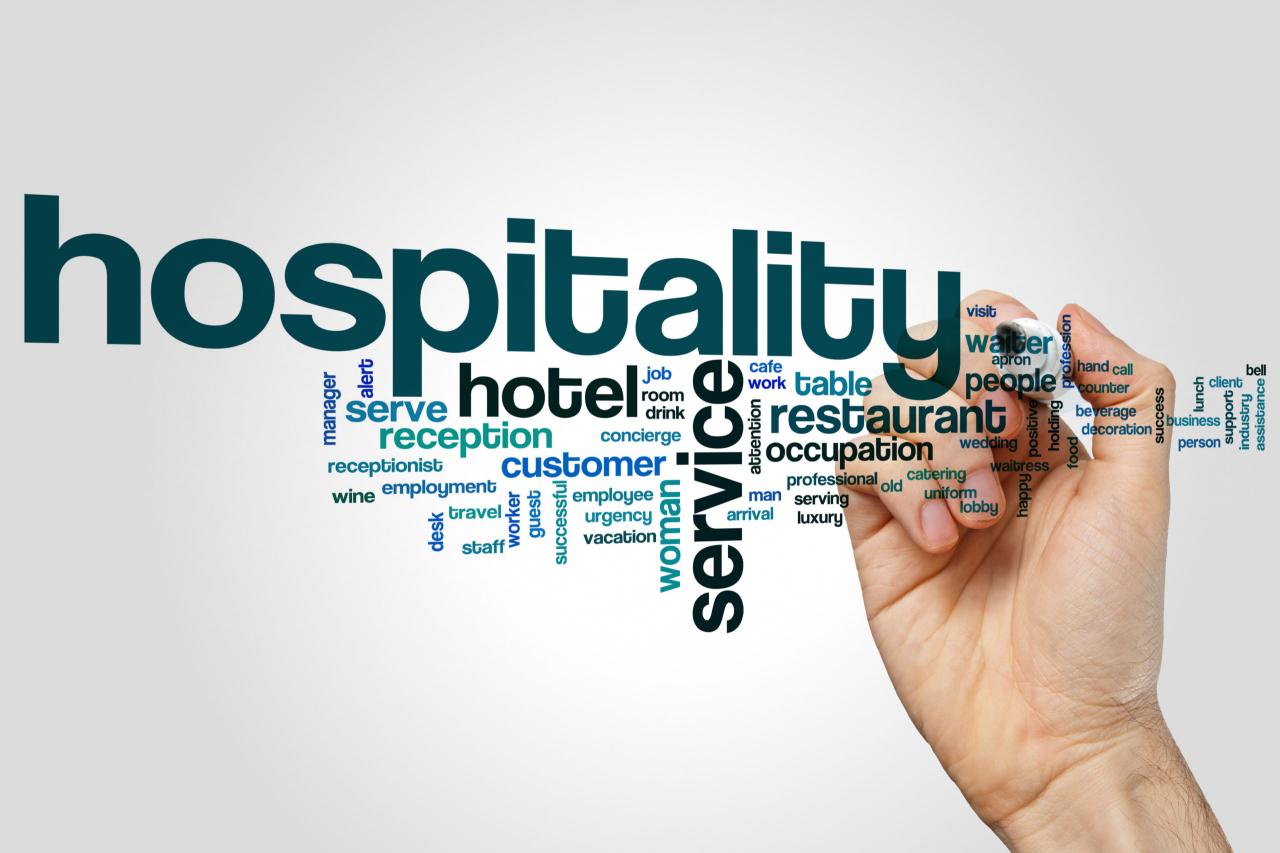Hospitality leadership training is the key to unlocking exceptional guest experiences and driving success in the industry. This comprehensive guide will explore the significance of effective leadership training, its key elements, and the latest trends shaping its future.
By investing in hospitality leadership training, organizations can cultivate leaders who possess the skills, knowledge, and mindset to create a welcoming and memorable environment for guests, fostering loyalty and maximizing revenue.
Importance of Hospitality Leadership Training

In the competitive hospitality industry, effective leadership is paramount for success. Leadership training programs equip hospitality professionals with the skills and knowledge to excel in their roles, enhance guest satisfaction, and drive operational and financial success.
Enhanced Guest Satisfaction and Loyalty
Well-trained leaders understand the importance of creating memorable guest experiences. They empower their teams to deliver exceptional service, resolve issues promptly, and go the extra mile to meet guest expectations. By fostering a positive and welcoming atmosphere, leadership training contributes to increased guest satisfaction, loyalty, and positive reviews.
Improved Operations and Revenue
Leadership training enhances operational efficiency by equipping leaders with the skills to streamline processes, optimize resources, and reduce costs. By fostering collaboration and accountability, leaders can create a work environment where employees are motivated and empowered to perform at their best.
This, in turn, leads to increased productivity, improved service delivery, and ultimately, higher revenue.
Examples of Successful Leadership Training
Numerous hospitality organizations have experienced significant improvements after implementing leadership training programs.
- A leading hotel chain reported a 15% increase in guest satisfaction scores after implementing a comprehensive leadership training program.
- A restaurant group saw a 10% increase in revenue after training managers on effective team management and guest relations.
- A travel agency reported a 20% reduction in operating costs after implementing a leadership training program focused on process optimization and resource allocation.
Key Elements of Hospitality Leadership Training

Hospitality leadership training is crucial for developing the skills and competencies necessary for success in the industry. This training focuses on enhancing communication, conflict resolution, and team-building abilities, which are essential for effective leadership in hospitality.
The core competencies and skills required for successful hospitality leaders include:
- Excellent communication skills, both verbal and written
- Strong conflict resolution skills
- Effective team-building skills
- Problem-solving skills
- Decision-making skills
- Interpersonal skills
- Cultural sensitivity
- Ethical decision-making skills
These competencies and skills can be developed through a variety of training methods, including:
- On-the-job training
- Formal training programs
- Workshops
- Mentoring
Communication Skills
Effective communication is essential for hospitality leaders. They need to be able to communicate clearly and concisely with guests, staff, and other stakeholders. Communication skills also include active listening and understanding the needs of others.
If you’re looking to advance your career in hospitality leadership, a master of business leadership can give you the skills and knowledge you need to succeed. This graduate degree program will teach you about the latest trends in hospitality management, as well as the leadership skills you need to motivate and inspire your team.
With a master’s degree in business leadership, you’ll be prepared to take on any challenge in the hospitality industry.
Conflict Resolution
Conflict resolution is another important skill for hospitality leaders. They need to be able to resolve conflicts between guests, staff, and other stakeholders in a fair and equitable manner.
Team Building
Team building is essential for creating a positive and productive work environment. Hospitality leaders need to be able to build and lead effective teams that are motivated to provide excellent service.
To advance your hospitality leadership training, consider pursuing a strategic leadership doctorate. This advanced degree equips you with the skills to lead and manage complex organizations in the hospitality industry. Enhance your strategic thinking, decision-making, and communication abilities to drive innovation and improve operational efficiency in your hospitality enterprise.
Evaluating the Effectiveness of Hospitality Leadership Training
Assessing the effectiveness of hospitality leadership training programs is crucial to ensure their impact and value. By evaluating the outcomes, organizations can make data-driven decisions about future training initiatives and maximize their return on investment.
Hospitality leadership training provides invaluable skills for managing teams and fostering a positive guest experience. However, if you’re interested in advancing your career in education, consider pursuing an ms educational leadership degree. This program equips you with the knowledge and skills necessary to lead and manage schools effectively, preparing you for a rewarding career in educational administration.
Upon completion of your MS in Educational Leadership, you can seamlessly transition back to hospitality leadership training, bringing a wealth of experience and expertise to your role.
Methods to Evaluate Training Effectiveness
Various methods can be used to evaluate training effectiveness, including:
- Surveys and Questionnaires:Gathering feedback from participants through surveys or questionnaires provides insights into their satisfaction, knowledge acquisition, and perceived impact on job performance.
- Observation and Assessment:Observing participants’ behavior and performance on the job can provide valuable data on the application of newly acquired skills and knowledge.
- Metrics and Data Analysis:Measuring key performance indicators (KPIs) such as guest satisfaction, employee engagement, and financial performance can help quantify the impact of training on hospitality operations.
- Return on Investment (ROI) Analysis:Calculating the financial return on investment (ROI) from training programs provides a tangible measure of their effectiveness.
Measuring the Impact of Leadership Training
To measure the impact of leadership training on hospitality operations, organizations can consider the following examples:
- Improved Guest Satisfaction:Training that focuses on enhancing customer service skills can lead to increased guest satisfaction, positive reviews, and repeat business.
- Increased Employee Engagement:Effective leadership training can foster a more engaged and motivated workforce, resulting in higher productivity and reduced turnover.
- Enhanced Financial Performance:Improved leadership skills can contribute to better decision-making, efficient operations, and increased revenue generation.
- Increased Innovation and Creativity:Training that encourages creative thinking and innovation can lead to new ideas and improved problem-solving abilities, benefiting the organization.
Trends in Hospitality Leadership Training

The hospitality industry is constantly evolving, and so are the leadership skills required to succeed in this dynamic environment. Hospitality leadership training programs are adapting to meet the changing needs of the industry, and several emerging trends are shaping the future of leadership development.
Technology and Innovation
Technology is playing an increasingly important role in hospitality leadership training. Online learning platforms, virtual reality simulations, and artificial intelligence (AI) are all being used to create more engaging and effective training experiences. These technologies allow learners to access training materials from anywhere, at any time, and to interact with simulations that provide realistic practice opportunities.
Innovative Leadership Training Programs, Hospitality leadership training
Hospitality companies are also developing innovative leadership training programs that go beyond traditional classroom-based instruction. These programs often incorporate experiential learning, mentorship, and coaching to provide learners with a well-rounded development experience. For example, the Ritz-Carlton Leadership Center offers a program that combines classroom instruction with on-the-job training and mentoring from senior leaders.
Ultimate Conclusion

Hospitality leadership training is not merely a one-time event but an ongoing journey of growth and development. By embracing innovative approaches, evaluating effectiveness, and implementing best practices, organizations can equip their leaders with the tools they need to navigate the evolving landscape of the hospitality industry and deliver unparalleled guest experiences.
FAQ Overview
What are the benefits of hospitality leadership training?
Hospitality leadership training enhances guest satisfaction, improves communication and team dynamics, boosts revenue, and prepares leaders for future challenges.
What are the key elements of hospitality leadership training?
Core competencies include communication, conflict resolution, team building, strategic thinking, and financial management.
What types of hospitality leadership training programs are available?
Programs range from online courses and workshops to immersive programs and mentorship opportunities.